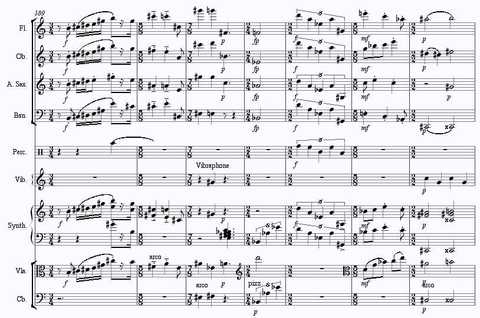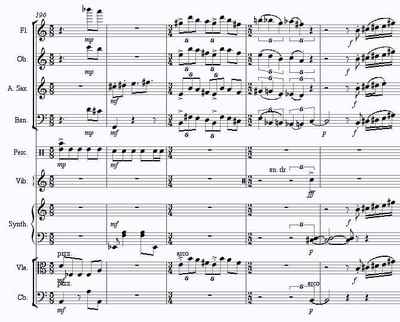main: February 2010 Archives
Critic Anthony Tommasini's piece in the Times today is headlined, "Dogma No More: Anything Goes." Isn't that a wonderful pronouncement? And the occasion for the article is his realization that young musicians these days are open to all styles, and no longer care about the aesthetic battles of the past. His evidence is a concert by the Ensemble ACJW that included a wild and eclectic mix of composers: Stockhausen, Babbitt, Berio, Davidovsky, Daniel Bjarnason. "Categories be damned!," Tommasini cries. Amen to that, and thank goodness musical politics have ceased to sway us. But wait a minute: I hadn't heard of Bjarnason, but I thought Stockhausen, Babbitt, Berio, and Davidovsky were composers who tended to all be championed by the same people all along. So I looked up Bjarnason, who's a 20-something Icelandic composer whose music is nominally tonal but dramatically virtuosic, and I have noticed, for years, now, that the same young musicians who champion atonal hardliners like Davidovsky and Babbitt also seem eager to find young European composers whose music is dramatically virtuosic. That those who champion complexity, drama, and European values in the old music champion it in the new as well hardly comes as a surprise.
And Tommasini notices a problem too: while today's young musicians are open-minded enough to accept not only Davidovsky but Bjarnason, they seem to avoid composers of a milder, more neoromantic bent, like Barber, Harbison, Christopher Rouse, and so on. Tommasini calls those the "mainstream" composers (young composers in that tradition have insisted to me that I refer to them as "Midtown"), but he also quotes Harbison's self-applied term "notes-and-rhythms composers." Now, this is ironic, because the interview with me that's in the July, 2008, issue of Musicworks magazine is titled "Pitch and Rhythm Guy" because that's how I referred to myself during the interview. The term would apply equally well to dozens of postminimalist and totalist composers I wrote about in the Village Voice during the 1980s and '90s. In fact, I once explicitly made this connection in a book: "If Copland, Harris, Barber, and their ilk represented a first wave of American diatonic consonance, postminimalism is the second." Of course, the postminimalists, Zen-oriented and antivirtuosic, represent an entirely different world than the mainstream neoromantics. And not only did no one in the postminimalist crowd make the ACJW playlist, they didn't even make Tommasini's round-up of the current panoply of styles among which today's young composers no longer discriminate.
Few critics have been as sensitive to the damage done by aesthetic style wars as Tommasini has, and he's scored some valiant points against the intolerance of the high modernists. But if he's going to convince me that the days of dogma are over, and anything truly goes, he's going to have to at least acknowledge that the large milieu of nonmainstream composers I write about exists. Otherwise, his failure to include us - and him of all people - just makes it look like certain doors are as tightly shut as ever.
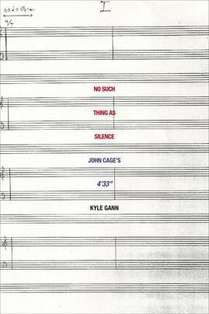 Two boxes of my book No Such Thing as Silence: John Cage's 4'33" arrived this week, the first time I've had a book and CD come out the same week. (Today I also received an announcement that an Italian edition is under way.) And although Amazon still has the release date as March 23, I've already gotten a nice review from Publishers Weekly. Especially gratifying were these lines:
Two boxes of my book No Such Thing as Silence: John Cage's 4'33" arrived this week, the first time I've had a book and CD come out the same week. (Today I also received an announcement that an Italian edition is under way.) And although Amazon still has the release date as March 23, I've already gotten a nice review from Publishers Weekly. Especially gratifying were these lines:
Following a biographical summary of Cage's early musical development, Gann considers the various influences that got him thinking about "silence, meditation, and environmental sound," from 20th-century composer Erik Satie back to the medieval mystic Meister Eckhart, moving on to a sensible reconstruction of the piece's development--down to telling details like the fact that its length is roughly the same as the temporal space on a 12-inch 78 rpm record. [Thanks to my readers for that latter insight.] Though Gann clearly respects Cage and 4'33", he doesn't worship either blindly, and that critical appreciation makes his argument that this is a radical "act of listening," not a provocative stunt, all the more compelling.
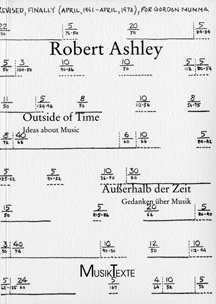
We have recently - about fifty years ago - come upon a new idea in thinking about music, but I think it is not even approached in theory. This new idea does not use the timeline score....
By timeline music I mean music having any number of parts, a piano score or an orchestra score, that are coordinated by bar lines. This music must, by definition, be "linear."...
Curiously, the most famous proponents - for Europeans and Asians as well as Americans - of a new kind of music among American composers, John Cage and Morton Feldman, could not escape from the timeline practice. They made wild (sometimes seemingly desperate) attempts to make a new kind of music, but their attempts were fundamentally still trapped in the timeline way of thinking. (I don't mean that their music was unsuccessful... I mean that to attribute to these two composers the kind of radical departure that one recognizes in Wolff or Brown, Behrman, Lucier, Amacher, Niblock, my own music and a few younger composers, is wrong.)
For everybody else who appeared around 1960 and is still around - Babbitt, Wuorinen, Reynolds, and countless others - there is no question that they ignored the message and continued exploring the timeline.
The first evidence of the non-timeline music came around 1960. (Typically, it was around earlier - especially in Wolff and Brown - but it really began to "flower" after 1960. It is hard to know whether Wolff or Brown realized what they were doing to the history of music. This is not to detract at all from their work - or their intelligence about their work - but, as I have maintained, the manifestation of an idea seems to happen before the idea is recognized and described....)
Another "historical" fact to be recognized is that the reaction to the practice of non-timeline music, particularly in the form of "minimalism" and "postromanticism," came not more than ten years after a lot of composers started doing non-timeline music. In other words, non-timeline music was very important and, in the case of the reaction to it, something perhaps to be feared. As if some composers were leading us in the wrong direction and things had to be corrected.
It's true, of course, that "time" passes while music is being played and while it is being listened to. But in non-timeline music (the drone) the time passing is not "attached to" the playing or the hearing. Time passes in the consciousness of the listener according to internal or external markers.
The feeling of timelessness can be created in a traditional timeline score using an extreme version of the timeline technique. That is, by pushing the timeline technique to an extreme of what can be written in a timeline score, I remember this, without being able to cite examples, from certain Earle Brown scores. The one example I can cite is Somei Satoh's Kyokoku. In this score for voice and orchestra Satoh uses a very slow tempo (twenty beats per minute) and allows that in certain sustained sections the conductor can slow the tempo even more, or can stop the tempo entirely. In these sections the feeling of timelessness is evoked....
Non-timeline makes no attempt to keep the attention of the listener. It exists as if apart from the attention of the listener. The listener is free to come and go. When the listener attends to the music, there is only the "sound." The sound is everything. When the listener is away, the music exists anyway. This is certainly a new idea....
I have called this new idea the "drone," because there is no better term that is not a neologism - like non-timeline music. I have said that I use the term "drone" to mean any music that seems not to change over time. Or music that changes so slowly that the changes are almost imperceptible. Many composers make this kind of music. The best known to me, offhand, are Behrman, Lucier, Radigue, Tone, Payne, Bischoff, Hamilton, along with others.
Or music that has so many repetitions of the same melodic-harmonic pattern that the pattern is clearly secondary to another aspect of the form. Philip Glass's early music is a good example. (Glass recently has more and more reverted to the timeline style.)
The non-timeline concept has permeated my music, though because of my deep involvement with speech rhythms and opera, I have not composed much music that is pure non-tineline. My early music - prior to 1980 - is much more clearly exploring the non-timeline concept. After 1980, when opera became the most important fact of my work, I began using certain aspects of the traditional score to coordinate many performers' actions (musical events) at any moment in the linear time pattern. I am still trying to escape from that constraint, but so far unsuccessfully....
What is in the nature of non-timeline music in the operas is the technique of allowing the harmony to continue for so long in a particular aria that harmony loses its traditional meaning....
The purpose is to create an intense self-consciousness in the listener, a kind of "meditative" state of mind. Of course, as in meditation, as I understand it, the attention in the listener will change constantly and is the responsibility of the listener. The composition exists "apart from" the listener, a musical fact to be observed and appreciated at the will of the listener....
In a simplistic explanation of "non-timeline" music the composer's purpose is dedicated to the sound of the work. The sound is everything. The sound has no temporal dimensions. It exists apart from the listener's participation. In non-timeline music nothing happens. The sound is simply there. [Variations on the "Drone," 2004; pp. 114-124]
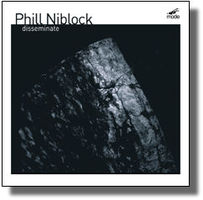
The "drone" is one of the special contributions to musical technique in the second half of the 20th century. I use the term "drone" - though most composers who will be named below will resent the term - because I can't invent another term or phrase that is not just musical jargon and that is not more understandable.
The drone has two pronounced characteristics. The first and most obvious is an unchanging, or barely changing, pitch. This characteristic, notably, is also the rarest among various composers' "signatures." Most composers moved away from the unchanging pitch technique almost as soon as they got involved with the drone....
Fundamentally the drone disregards pitch change. And so the musical time seems to stop. This lack of eventfulness is a challenge to the listener that the composer of any form of drone music must live with (and/or "solve" by some other technique)....
A second characteristic of the drone, but I think part of the same tendency, is a quality of unchanging tonal "color"; that is, an unchanging instrumental sound, regardless of what other elements of musical composition are employed. One could name any number (a large number) of composers who work in this area. These composers have abandoned the "narrative" or "dramatic" notion of the orchestra as a collection of "characters"....
The drone seems peculiarly American. The reasons are probably many.
No American ensemble would play any living composer's music in the 1950s, and so any new technique that deviated from the performer's conservatory training was discouraged. One could call that situation a form of poverty (for the composer) and a deciding factor in the invention of a new technique. But, of course, historically poverty has produced a lot of changes in music.
Another reason, I believe, was the American composer's unusual interest in the music of other cultures, particularly (because they were available on records) the various musics of Southeast Asia, the various musics of Africa and the various musics of the marginal black and marginal white isolated cultures in the United States. And all of these musics seemed to have fewer "changes" and a simpler "architecture" than the music we had inherited from the concert stages of Europe.
But most important, I think, was the advent of electronic music. Prior to the use of electricity the energy source for music was physical (human) and the limitations on that energy source had to be accommodated in the music. The music had to rest, had to be softer for awhile, had occasionally to be texturally less dense. With a new source of energy coming from the local utility company all of that changed. Conceptually, the music could go on at any level of intensity forever....
Two major things struck me about Ashley's passage that I quoted. One was his scathing critique of the attenuated place of art in western society, as seen from an experience of other cultures. Certain Asian and African cultures are more pervaded by music, art, and dance than ours, more informed by frequent social rituals involving entire communities. This phenomenon has been expounded upon for decades now by ethnologists and historians of Third-World art from Ananda K. Coomaraswamy to Ellen Dissanayake and beyond. I myself have written about it repeatedly from my slim experience of Native American performances: at powwows at Hopi, Taos, and elsewhere, every single inhabitant down to the smallest toddler strong enough to lift a drumstick is engaged as a singer, dancer, even composer, only the Whites are mere spectators, yada yada yada. Ashley's point, that the entertainer/consumer paradigm of American society deprives us of this intense social art experience, is hardly unusual or controversial, though it is presented here with striking vividness and in terms that musicians can easily identify with.
The astonishing thing about the passage I quoted was that Ashley offers this critique, not from the enthomusicologist's conventional standpoint of immersion in Indonesian or Ghanaian culture - but from the standpoint of the ONCE festivals! The rhetorical trick of the passage is that it focuses on widespread contemporary practice and seems to mention the ONCE festivals only in passing: "The reproach to what had gradually come to be the feeling that music was everywhere, that you were part of it and you were actually in it in your daily life was enforced for some cultural reason I cannot understand." But in reality, the ONCE festivals are the focus. Ashley is telling us that the ONCE festivals in Ann Arbor in the '60s created the same sense of art pervading a community that one gets from living in Bali or Tehran or Lagos, that once you had your worldview conditioned by the ONCE festivals, coming back down into the relative superficiality of American so-called culture was a tremendous let-down. It's an extraordinary claim, and made with disarming rhetorical cleverness. You read someone describing the innocent platitudes with which we are all familiar in such contrarian terms, and you wonder, from what experience did he come that he can afford to take such a jaundiced view of our daily lives? And that leads back to the question: Gosh, what must the ONCE festivals have been like, that afterward one would ever after resent what to the rest of us is mere normality?
Now: did Ashley say recitals were awful, and he never goes to them? No. He says, "Recitals are a curse," and it's an admirably exact formulation. They are a curse because we artists are forced to try to project the potential effects of art through this unequal entertainer/consumer relation, with one hand tied behind our backs, so to speak. Doesn't everyone feel this? I certainly do. Since Ashley disparages entertainment, isn't he just another elitist saying that composers shouldn't be required to entertain? Quite the opposite: he is saying that music should entertain and do much more than entertain, that it should grip and transform us and its effect should last long after the actual experience has ended. Isn't he making fun of world music, which has so enriched American culture? I think he's saying that the reduction of gamelan to a recital performance creates a facile and dangerous false impression, and threatens to destroy something special in other cultures that our music lacks. Isn't he just bitter? Well, I've yet to meet a composer who doesn't have his or her bitter moments, but Ashley's one of the least bitter composers I've ever met, and I read no bitterness in this passage. I see it as an enormous public service to remind us all from time to time that art can have a much higher and more potent role in a society than it currently does in ours. No one, no one is really satisfied with the status of contemporary music in today's world. Shouldn't those who've seen first-hand how things could be better do us the honor of showing us a potential goal toward which we could pragmatically strive?
I can imagine someone reasonably disputing Ashley's argument. For instance: "I was at the ONCE festivals, and they weren't as transformative for the community as Bob thinks." Or maybe, "I've lived in Bali for 30 years, and among locals there's more of a spectator aspect to gamelan performances than Mr. Ashley imagines." Those might be true, might not be true, but at least they would engage the accumulated meaning of the entire passage. I'd even appreciate a broad, well thought-out defense of the Western concept of art that took the ethnological critique into sympathetic account. But the negative comments that came in were reactions to isolated sentences, and I hardly have time to defend every writer I quote (though I'm doing it for Bob now), or my own writings, from potential implications of particular sentences when those implications are nuanced and limited and even subverted by the meaning of the passage taken as a whole.
This brings to light, perhaps, an important difference in modality between blog reading and book reading. I'm reading the book; if I run into a passage, a sentence, that seems shocking or questionable, I don't put the book down and phone Bob to dispute him; instead, I keep reading. As I do so, further paragraphs put former ones into perspective. The accumulation of new ideas begins changing my mind in ways that make the previous stumbling blocks seem more logical. On a blog, however, I'm beginning to suspect that the tempting proximity of that comment button works against the cohesion of entire passages, as readers scan for sentences that touch on some subject they have a pre-formed experience with or opinion about. The eagerness everyone exhibits to be an active part of an intellectual community is a touching aspect of what the internet has brought out in us all. But I could almost wish there were a function that could sense whether a comment was positive, neutral, or negative, and in the last case, flash a warning question: "Have you reread the entire blog entry to make sure you understand its full argument? Y/N." This is why blogs, and electronic print in general, will never replace books. The stolid unmalleability of a printed book forces you to live for a while with the ideas therein, and give them a chance to transform you.
This semester for the first time in ten years I'm again sitting in a classroom on the students' side: I'm taking a course called "Kierkegaard: A Writer's Identity" taught by my brilliant friend Nancy Leonard. God bless me, I'm rereading Either/Or for the first time since the 1970s, and having a blast. So I finished "Diary of a Seducer" and, far more mature than I was last time I read it, I accumulate a million objections to Kierkegaard's fevered fantasy - and then I turn to the Or volume, "The Aesthetic Validity of Marriage," and, bing, bing, bing, bing, - Kierkegaard has anticipated my every objection and then some, and then I start to form reservations against that argument as well. Imagine Kierkagaard as a blogger, indulging in wild psychological flights only to contradict them later after his readers had already been fooled into commenting: impossible. And yet he wrote one of the most voluminous journals that's ever been published, and I've been thinking a lot about the extent to which a blog is a public journal. I kept a journal when I was in my 20s, which got replaced by my newspaper writing in my 30s, whose impulse has been transferred to this blog in the last several years. Kierkagaard's journals, of course, weren't published until long after his death. Had his writing of them been conditioned by a consciousness that each one would immediately gather a string of comments, we would doubtless have lost one of the world's great psychological treasures.
We don't yet know where this blog thing is going, or what new kind of reading modality it's going to lead to. Despite my grumpy resentment of selected new gizmos, I'm really no Luddite at heart, and I have an instinctive faith in mankind's ability to adapt healthfully to new technologies. It would be ridiculous to have a 30-minute timer on the comment button to force each reader into half an hour's reflection before objecting - but it would certainly have a salutary effect in numerous cases. Perhaps I simply create problems by forcing book-style content into a blog format where it doesn't belong. But I think I'm too addicted to book-style content (and too little attracted to the links-of-the-week mode of most blogs) to do otherwise.
Recitals are a curse. Forget for the moment the history of how they came into being. Recitals are a curse. They make the musician into an entertainer, rated, say, on a scale of ten: Ashley = 1; Michael Jackson = 10. They make the audience into a consumer, requiring the equivalent of a restaurant guide: should I go to hear Ives's songs sung by somebody I have never heard of or should I go to hear an Indonesian gamelan, played by people I don't even know about, or should I go to the Philharmonic and hear some turn-of-the-century Austrian music? Dear me.
The political reaction of 1970 was a return to recitals. That the music was called minimalism or the uptown complications of serialism doesn't matter in the least. The reproach to what had gradually come to be the feeling that music was everywhere, that you were part of it and you were actually in it in your daily life was enforced for some cultural reason I cannot understand. The ONCE Group pieces had come more and more to suggest the idea that you were a character in an opera that was bigger than you could understand. That is why we were [physically] attacked at Brandeis and elsewhere. Because we had stopped giving recitals.
Recitals were a perfect format for so-called "world music." Balinese gamelan, no problem. Bong bong bong. How cute. That the gamelan was part of a larger ceremony of cremating the body, drinking the pig's blood and not sleeping for a week didn't enter the picture. Bong bong bong. How cute.
"World music" has been a disaster for America. It doesn't kill people, like AIDS, but it has made us all into consumers, because we are not from Indonesia or South America or China or wherever, and so can only sit there listening to the sounds, wondering where we will eat after the concert, hoping the baby-sitter is behaving and, all in all, wishing we were at home. So we are at the mercy of the "distributor," who makes all things available, but takes the music out of our hands. The distributor, in this case, is the music school and its patrons, who - certainly without understanding what they are doing, what is happening - turn us all into either entertainers or consumers.
That palpable but invisible wall between the entertainer and the audience is a fact of the recital. As a member of the audience you are a consumer and a consumer only. Take your seat. The musicians come on stage. Two or three pieces. Intermission. Two or three pieces. End. You are back out on the street having had an experience, which in most cases lasts only as long as the experience itself. This is a recital. It could have been juggling or a live porno act. Whatever it is, you are not part of it. You have been a watcher. The recitalist hopes that you have been entertained. But you have not been included. You have simply been distracted from what is outside. You do not have more of a musical life. Your life is not more musical.
This is our situation today. And it's not much fun. Because the composer does not have the idea of including the people who come while the music is being enacted. We have lost the idea of the rituals that remind the people who come that what is happening is only a small part, a "surfacing" of the continuing musicality of everyday life.
Actually, those rituals do not exist, except in television and probably in sports events. Everybody plays baseball or football or basketball or soccer or hockey (or wishes they did or thinks they do) so the game is only a "version" of what is part of your life. You are emotionally in it. That is what I mean by ritual. Everybody does not go around singing Mahler or Ives or Feldman or Palestrina. The music is foreign to you. Interesting, maybe, but foreign, like the gamelan. You are not in it. Mostly music students go to recitals. This is true, maybe more so, even if the music is all by living composers. Not that we should expect huge audiences for recitals. But we should expect that the audience is a part of the music, and this is not true, even if the audience is entirely music students. This is the dilemma of contemporary music. The ritual has disappeared. The event is hollow. ["Speech as Music: A Musical Autobiography," pp. 54/56]
Sites To See
AJ Ads
AJ Blogs
AJBlogCentral | rssculture
Terry Teachout on the arts in New York City
Andrew Taylor on the business of arts & culture
rock culture approximately
Laura Collins-Hughes on arts, culture and coverage
Richard Kessler on arts education
Douglas McLennan's blog
Dalouge Smith advocates for the Arts
Art from the American Outback
For immediate release: the arts are marketable
No genre is the new genre
David Jays on theatre and dance
Paul Levy measures the Angles
Judith H. Dobrzynski on Culture
John Rockwell on the arts
innovations and impediments in not-for-profit arts
Jan Herman - arts, media & culture with 'tude
dance
Apollinaire Scherr talks about dance
Tobi Tobias on dance et al...
jazz
Howard Mandel's freelance Urban Improvisation
Focus on New Orleans. Jazz and Other Sounds
Doug Ramsey on Jazz and other matters...
media
Jeff Weinstein's Cultural Mixology
Martha Bayles on Film...
classical music
Fresh ideas on building arts communities
Greg Sandow performs a book-in-progress
Harvey Sachs on music, and various digressions
Bruce Brubaker on all things Piano
Kyle Gann on music after the fact
Greg Sandow on the future of Classical Music
Norman Lebrecht on Shifting Sound Worlds
Joe Horowitz on music
publishing
Jerome Weeks on Books
Scott McLemee on books, ideas & trash-culture ephemera
theatre
Wendy Rosenfield: covering drama, onstage and off
Chloe Veltman on how culture will save the world
visual
Public Art, Public Space
Regina Hackett takes her Art To Go
John Perreault's art diary
Lee Rosenbaum's Cultural Commentary
Tyler Green's modern & contemporary art blog
